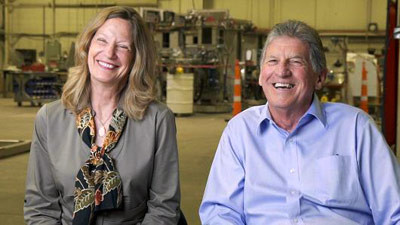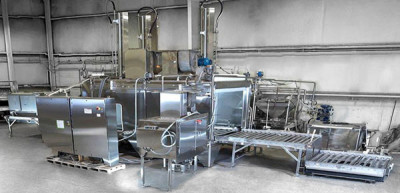CPS don't just think outside the box, they build the box
Custom Powder Systems (CPS) designs, builds and automates the equipment used to dispense, size, mill and blend the powders used in the pharmaceutical, food and chemical industries. The company also provides cleaning systems that rid these machines of powder residue, preventing cross contamination, ensuring FDA safety regulations are met and protecting the machine operators. Every tablet you take started as a powder, and anything in a food package from powdered milk to cocoa may have involved a CPS machine. Read a CNBC story about the firm.

Many manufacturers make bins, blenders, component pieces and software, sometimes even outsourcing components. CPS ties all these pieces together.
As their website says, they don’t just think outside the box. They build the box.
CPS applied for the TAAC program in 2011 but didn’t qualify. 2014 was not a great year for CPS, either, says CEO Denise McIntosh. Later, McIntosh and husband Dale McIntosh were seated at the same table as Jeannine Goodrich, TAAC project manager, at a Missouri Association of Manufacturers luncheon, and the McIntoshes thought, Why not try again? They re-applied and were accepted into the program in 2015.
TAAC funds helped CPS reinforce their website with testimonials and videos of employees sharing what they know; a value stream map, which is essentially a SWOT analysis, done by BDP partner Missouri Enterprise; software to make their phone system work better (“It’s hard to work without phones,” says McIntosh); relaunching and more fully utilizing an ERP system; and other marketing and process improvements.

Married couple Denise and Dale McIntosh teamed up to form Custom Powder Systems, LLC in Springfield, Mo.
Here’s a Q&A with McIntosh, a former entrepreneur who decided to team with her highly industry-savvy husband to form CPS.
Q: Did you find the application process difficult?
A: Jeannine is a gem. She makes the process, which can be somewhat difficult, the paperwork a little overwhelming, much easier. She helps make something pretty complicated seem simpler.
Ken Scheve (former TAAF counselor, who helped with the value stream map) and she have been very professional, very helpful. They understand manufacturing, and they have seen how other people use the funds.
We had to do a good review of our company, our processes, where we really needed to focus, to best use these funds. That in itself was a good review of where we were, what we could do to improve.
Q: Why the employee videos?
A: We are a relationship company. So videotaping our people, describing who we are and what we do, helps build relationships. And 75-85 percent of our business is referrals or returning clients. One of our latest projects came about because they saw one of our videos, a safety video. They said, ‘We don’t work with any company with a bad safety rating.’
Another time, a group of people came in. They had just given us a PO for $1 million. I am just down the hall from the front door and I heard them, got out of my chair, went up to introduce myself, and they said. ‘No need to introduce yourself. We know who you are from your website.’
Q: How did you get into this line of business?
A: Dale has been in it for quite a while. I had started a business with a college friend, crop insurance, and Dale was talking about starting this business. I told him, ‘Here’s what I know: Starting a business isn’t rocket science, but it is real hard work. If we are going to do hard work anyway, why not do it for ourselves?’
The person I started the crop insurance business with said, ‘Denise, here’s the thing. You have survived the worst economic time of our lifetime and you survived.’ People are not going to quit using powders. We know the demand is there on the chemical side, food, oral dosage in pharmaceuticals.
Q: What does the future hold for CPS?
A: We’re looking at India and China. There are people there who have never even taken an aspirin. We have a project going on in China now, with TAAF help, a major pharmaceutical manufacturer looking to manufacture there. (These drugs can then be imported into the U.S.) Those drugs targeted to come back into the U.S. will have to be approved by the FDA, of course. So I think in my lifetime, we are going to see Chinese and Indian manufacturers with the same kind of equipment we see here in the U.S.
We will expand our services, too. We recognize that people are far more interested in companies that can take on a whole system, not just one piece of equipment. This pharmaceutical manufacturer is working with three other Springfield companies. We are coordinating the whole thing. We are buying from them, and we will automate it all. Companies don’t want to have to go to four separate companies, then find an automation group on top of that. They want turnkey solutions.
Q: How many employees does CPS have, and what are your current revenues?
A: We have over 80 at this point. In 2014, it was somewhere around 65, 66. We’ve added people because we’ve added projects, and we can thank TAAC for that. Revenues, we hit just above $12 million in 2015.

An integrated CPS system.
Update: In a release from the office of the governor, it was announced that CPS will create 15 new jobs in 2016.
The jobs were created with the help of Missouri Works Training, a state incentive program that has provided nearly $98 million to hundreds of businesses to train nearly 300,000 workers and create more than 10,000 new jobs, according to the governor’s office. In fiscal year 2017, $10.2 million was approved through Missouri Works Training to help 317 companies, including CPS, improve worker skills and expand their businesses.